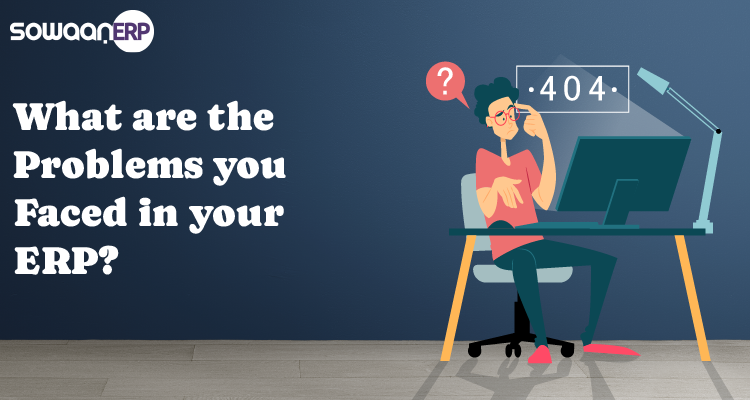
ERP systems have been the talk of the town for quite a long time now. These systems have gained significant importance in recent years as they simplify business processes and assist in many aspects of a business. These aspects include financial management, inventory management, human resource roles, payrolls, manufacturing, purchasing, and many more. An organization can count implementation of ERP software as one of their biggest achievements. However, implementation of an ERP system has never been an easy process, but now, thanks to technological advancements, the process has become much faster and more efficient.
You would have heard the quote, “With great power, comes great responsibility”. The same goes for ERP systems. While ERP systems seem quite simple to set up, they are not. There are some common problems that ERPs face and today, we are going to discuss them one-by-one. In this article, we will also enlighten some of the key features of the best ERP system in Saudi Arabia.
Hurdles that might arise while implementing an ERP system
Choosing the Right System
The most common problem is here, choosing the right software. While it might seem an easy step, it possesses the power to make or break your future as one single decision can turn your dream of having a streamlined business into a devastating nightmare. This step requires a lot of research, planning, meetings, contacts, inquiries, and many more. This is one of the most crucial steps of implementing an ERP system.
Resistance to Change
Now what is the next thing once you have implemented your ERP system? Training people and adapting them to change. People in the business industry are so attached to their roots. They do not wish to leave their old ways and advance to new methods to keep the business running. That step demands two major skills of society, which are leadership and effective communication.
Maintenance Costs
Many vendors offer you discounted and cheap prices, then once the ERP system is implemented, ABRA-CA-DABRA, here comes the hidden costs by magic. This can even cost you an arm and a leg which is why it is extremely important to partner with the best ERP system in Saudi Arabia with transparent pricing.
No Proper Usage of Key Features
Organizations blindly spend millions of dollars on an ERP system but fail to recognize the power it holds. One of the reasons is the lack of training features. This step has turned many lively organizations into a part of the silent graveyard which is why it is crucial aspects to inquire about the training modules that the vendor will provide.
Limited Testing
Testing a product does not mean that the product runs smoothly, it is about getting delighted after using the product. ERP systems also require heavy testing in order to check whether the system stands on the grounds or not, when completely loaded. Don’t feel ashamed about asking the vendor to give you a trial period. After all, you need to make sure that you are getting the best out of your money.
Key Features of the Best ERP System in Saudi Arabia
Before you opt to buy the best ERP system in Saudi Arabia, it is important to learn the key features and benefits of ERP software. The key benefits are the decision-changers of the market and thus need to be examined quite carefully. Here are some of the key features of the best ERP system in Saudi Arabia.
Localization
The ERP system should be capable of robust localization for the Saudi Arabian market. This includes Arabic language support, Arabic numerical systems, the Islamic calendar, and conformity to Saudi legal and financial standards. Without localization, the ERP system won’t be able to stand in the Saudi Arabian market.
VAT Compliance
In 2018, Saudi Arabia established a value-added tax (VAT) system. Ascertain that the ERP system can handle VAT calculations, reporting, and compliance with local tax legislation. It should provide tools for managing VAT rates, invoicing, and reporting obligations.
Zakat and Tax Accounting
Zakat is an Islamic type of charity contribution based on the financial success of a business. The ERP system should have modules or functions that allow for the appropriate calculation, tracking, and reporting of Zakat contributions in compliance with Saudi accounting procedures.
Saudi Banking Integration
Integrating with local Saudi banks is critical for smooth financial transactions. The ERP system should be able to integrate with major Saudi Arabian banks in order to simplify automated payment processing, bank reconciliation, and other banking-related tasks.
Data Security and Privacy
The ERP system should emphasize data security and ensure that it complies with Saudi Arabian data protection rules and regulations, such as those enacted by the Saudi Data and Artificial Intelligence Authority (SDAIA). It should include strong security measures, encryption, access restrictions, and alternatives for data residency within Saudi Arabia.
Apart from all these, there are a number of key features of the best ERP system in Saudi Arabia that should also be considered. Another consideration is to check the unique requirements of your business and make sure that the ERP system you have chosen should align with all those needs. A final piece of advice, make sure to overcome all the problems mentioned up while opting to buy the best ERP system in Saudi Arabia.
